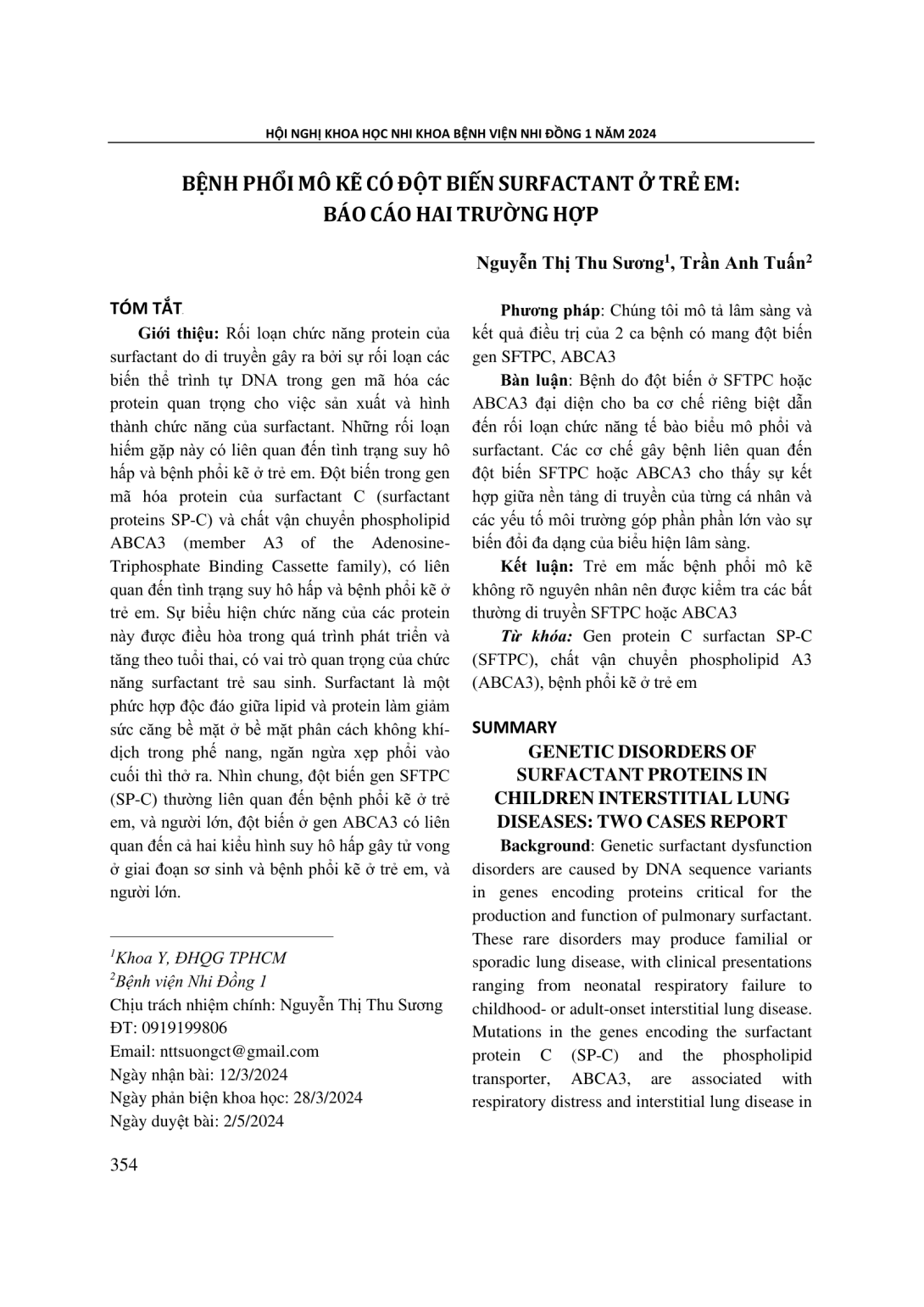
Rối loạn chức năng protein của surfactant do di truyền gây ra bởi sự rối loạn các biến thể trình tự DNA trong gen mã hóa các protein quan trọng cho việc sản xuất và hình thành chức năng của surfactant. Những rối loạn hiếm gặp này có liên quan đến tình trạng suy hô hấp và bệnh phổi kẽ ở trẻ em. Đột biến trong gen mã hóa protein của surfactant C (surfactant proteins SP-C) và chất vận chuyển phospholipid ABCA3 (member A3 of the Adenosine-Triphosphate Binding Cassette family), có liên quan đến tình trạng suy hô hấp và bệnh phổi kẽ ở trẻ em. Sự biểu hiện chức năng của các protein này được điều hòa trong quá trình phát triển và tăng theo tuổi thai, có vai trò quan trọng của chức năng surfactant trẻ sau sinh. Surfactant là một phức hợp độc đáo giữa lipid và protein làm giảm sức căng bề mặt ở bề mặt phân cách không khí-dịch trong phế nang, ngăn ngừa xẹp phổi vào cuối thì thở ra. Nhìn chung, đột biến gen SFTPC (SP-C) thường liên quan đến bệnh phổi kẽ ở trẻ em, và người lớn, đột biến ở gen ABCA3 có liên quan đến cả hai kiểu hình suy hô hấp gây tử vong ở giai đoạn sơ sinh và bệnh phổi kẽ ở trẻ em, và người lớn. Phương pháp: Chúng tôi mô tả lâm sàng và kết quả điều trị của 2 ca bệnh có mang đột biến gen SFTPC, ABCA3 Bàn luận: Bệnh do đột biến ở SFTPC hoặc ABCA3 đại diện cho ba cơ chế riêng biệt dẫn đến rối loạn chức năng tế bào biểu mô phổi và surfactant. Các cơ chế gây bệnh liên quan đến đột biến SFTPC hoặc ABCA3 cho thấy sự kết hợp giữa nền tảng di truyền của từng cá nhân và các yếu tố môi trường góp phần phần lớn vào sự biến đổi đa dạng của biểu hiện lâm sàng. Kết luận: Trẻ em mắc bệnh phổi mô kẽ không rõ nguyên nhân nên được kiểm tra các bất thường di truyền SFTPC hoặc ABCA3.
Genetic surfactant dysfunction disorders are caused by DNA sequence variants in genes encoding proteins critical for the production and function of pulmonary surfactant. These rare disorders may produce familial or sporadic lung disease, with clinical presentations ranging from neonatal respiratory failure to childhood- or adult-onset interstitial lung disease. Mutations in the genes encoding the surfactant protein C (SP-C) and the phospholipid transporter, ABCA3, are associated with respiratory distress and interstitial lung disease in the pediatric population. The surfactant proteins are developmentally regulated, such that their expression increases in later gestation. Pulmonary surfactant is a unique mixture of lipids and proteins that reduces surface tension at the air-liquid interface, preventing collapse of the lung at the end of expiration. In general, mutations in the SP-C gene SFTPC are more commonly associated with interstitial lung disease in older infants, children, and adults. Mutations in the ABCA3 gene are associated with both phenotypes: fatal respiratory distress in the neonatal period and interstitial lung disease in older infants, children, and adults. Methods: two cases presentation, we describe two patients carrying the SFTPC, ABCA3 mutation, clinical course, and outcome. Conclusions: Disease due to mutations in, SFTPC or ABCA3 represents three distinct mechanisms that lead to pulmonary epithelial cell and surfactant dysfunction. The disease mechanisms associated with SFTPC or ABCA3 mutations suggest that the combination of individual genetic background and environmental factors contribute largely to the wide variability of clinical expression. Conclusion: Infants, children with ILD (interstitial lung disease) of unknown etiology should be investigated for SFTPC or ABCA3 genetic abệnh nhânormalities.
- Đăng nhập để gửi ý kiến
